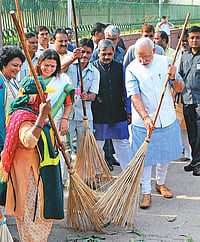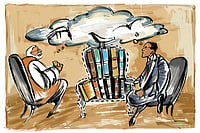The adjective ‘emerging’ is often used to describe India. We are an ‘emerging democracy’ and have now been described, in matters military, as an ‘emerging global power’. Most commentators have accepted this description, although what we are emerging from, and emerging towards, remains a matter of heated debate. This discussion on our transitions, the plural being necessary to distance the argument from a suggestion that the change is linear, naturally begs the question of who is leading this process. In a society as large and complex as India, and one that is undergoing, through democracy, a multi-layered transformation, the process requires enlightened direction. We are today in unexplored territory. In such a context, leaders are significant.
There are many typologies of leadership on offer: the decisive leader, the charismatic leader, the consultative leader, the visionary leader, the thinking leader etc. Given India’s complexity, these models are inadequate, and so we need to think beyond the qualities of the leader alone and look also at the situation in which the leader has to work. Can the leader convert the societal gains of the last hundred years into emancipatory resources available to the people? For a leader to be on top of such a historical opportunity, we need to ask what is required of her: vision, passion, rhetoric or ideology? In our mediatised society, where spin is becoming reality and TV anchors produce truth, how will we distinguish between the gains that accrue from what they are claimed to be? These are not simple questions and hence require answers at many levels, for we are at a historical juncture where we can either build on what we have inherited or squander them through a politics of smallness. Leadership will be decisive to the outcome.
A discussion on leadership in India today must take place within a particular frame. There are two crucial aspects of this frame. Let me lay them out. The first is the recognition of the contrasting consequences that accrue to society when leaders pursue their private interest over the public interest. While this sounds like a truism, not worthy of column space, it is not so, since it is actually difficult to recognise when a decision, or action, or recommendation, is in the public interest and not in the private interest. Politicians claim that all that they do is in the public interest. They even believe it. In their many years in politics, they have produced a reality where, for them, the distinction between the two has become blurred. For example Akhilesh Yadav describes his special interests on the Samajwadi Party website as “helping the poor and fighting against corruption”. The Aam Aadmi Party claims that it “wants to make politics a noble calling once again”. In the face of such virtuous sentiments, we need to have a clear rule by which we will recognise when what is done is in the public interest and when it is not.
A political leader in India needs to act primarily in the public interest. Although this appears so much like a cliche, its power in the public imagination cannot be underestimated. Just recall the titles we have bestowed on our leaders: Mahatma, Gurudev, Deshbandhu, Deenbandu, Pandit, Loknayak, Acharya and the Nightingale of India. Analytically, acting in the public interest means that the leader, after examining the options available, rejects those options that benefit primarily the self and accepts those that primarily benefit many others. Acting in the public interest means dissolving the self and becoming the other, in both thought and action. Acting in the public interest means imagining the needs of the other, sarvodaya, and then adopting a path of action that works to fulfill them. These definitions may seem like motherhood and dahi, but I urge a little patience as I develop my argument from these necessary distinctions.
The biggest problem in India today is that most of the political leaders we have think primarily in terms of private interest and not of public interest. A tectonic change has occurred in our political culture as the centre of gravity has shifted from one where public interest was the principal determinant of politics to one where private interest is the driver. This change has multiplier consequences. It has changed the texture of our public life. How else can one explain the Vijay Mallya story, where an MP, owner of Force India, beneficiary of bank largesse and now a wilful defaulter, is soon to be declared a fugitive from the law. Mallya’s is not an isolated case. It is an illustration of the way in which private interests have taken over the state. It is a confirmation that the public interest has been defeated. More examples of this ‘takeover’ can be given from every region and from every sector.
When all those in the top echelons of power begin to think primarily in terms of private interest, as they are doing today, different from the period of the 1950s, when the INStitutions for independent India were being built, the aggregation of this private pursuit results in what we witness today: dying rivers, toxic NPAs in the public sector banks, displaced adivasis, overcrowded and unplanned cities, a securitisation of our civic life by CCTV installations, an agrarian crisis of enormous proportions, restlessness among the youth, the communalisation of our society and so on. How else can we explain this situation but as the aggregate outcome of the individual pursuit of private interest. I believe that causal explanations have to be sought at this level of abstraction and not at the micro level, as we are doing. Such public behaviour has reached epidemic proportions. Adam Smith’s hidden hand, the one that produces public good from the pursuit of private interest, does not seem to be working.
Even if my causal explanation is accepted, how would I respond to the objection that such people, who pursue the public interest over the private interest, do not exist anymore? They are pure fiction. In answer, let me list a few names. Acharya Vinoba Bhave, Mother Teresa, Mohan Sinha Mehta of Seva Mandir from Udaipur, Elaben Bhatt of SEWA, V. Kurien of Amul, Homi Bhaba of TIFR, Aruna Roy of MKSS, and writers such as Mahasweta Devi and U.R. Ananthamurthy. Such people are present even outside politics as is shown by the following incident. On May 21, 2016, the mountaineer Leslie Binns saved the life of Sunita Hazra on Mt Everest. To do so, he had to abandon his attempt at reaching the top when he was just 500 metres from the summit. Sunita’s life was more important than the glory of the mountain top. Further, let me offer two names as a provocation, so that each one can find two more to add to the list: Raghuram Rajan (although I have differences with his notion of the public interest) and Bela Bhatia (Google her to find out more about what she is doing). And finally, what about the elephant in the room? I shall not answer.
While I have spent some time urging us to assess our political leaders in terms of the public versus private interest distinction, let me now move to the second framing issue, the lakshmanrekha that is not to be crossed. We are a plural society and not hurting sensibilities of communities is an important part of a political culture of building a harmonious social fabric. This rule applies to political leaders, and not to artists, for they have to take everyone along. While harmful social practices must be challenged by leaders, such challenge must pass what I call the emancipatory test. Will it add to or diminish the greater freedom for our people? How should one then read the sustained campaign against Muslim and Christian minorities, and against the poor residents of the Chottanagpur plateau? Statements such as ‘Muslim-mukt India’ and “when a big tree falls...” and “action and reaction”, I believe, cross that lakshmanrekha. Our social fabric has been badly frayed by this new politics of smallness, by offensive statements intended to deliberately divide. The social fabric needs healing. But who will lead this process?
And this is where the conundrum arises. Such a politics of divisiveness has become widespread, producing electoral dividends across the globe. Donald Trump has defied political pundits who had forecast his demise after his statements against women, Mexicans, and his allies in Europe, and yet his campaign has only grown in strength as it has grown more abusive. Recep Tayyip Erdogan of Turkey has consolidated his hold on power as he has taken a strident militaristic stand against the Kurds and an authoritarian attitude against dissidents, jailing many of them. Rodrigo Duterte is the president-elect in the Philippines, after staging a populist campaign where he has bragged about his sexual prowess, mocked the Pope, and railed against journalists who opposed him and whom he threatened to have shot. Netanyahu of Israel has imposed a militaristic apartheid system against the Palestinians, building a wall to deny them their human rights of free travel, thereby robbing Israel of the moral high ground which a historically persecuted people can rightly claim. And yet, unprecedented in the political history of Israel, he has won three elections. What is it about these four leaders in democracies that the more abusive they are the more electorally successful they become? What is it about democracy that rewards what should instead be punished, divisive and hateful language? What is it about democracies today that allow some people to fool most of the people all the time?
It cannot be anyone’s argument that we need a ‘new people’. And so we need to look for answers elsewhere. It is quite clear that the people are revolting against two things: a form of politics that only benefits politicians; and the livelihood uncertainty that has descended on ordinary people in this globalised world. To escape from these two conditions, disgust and anxiety, the people reward those they consider as politicians who are different, who have charisma. This is an aura that is created by a carefully orchestrated media campaign. Charisma, as Max Weber has analysed, is a relationship of devotion between the leader and the followers. In the mediatised world we live in, this is manufactured by media managers. And as they do, we live in a surreal and schizoid world, one created by the media and one experienced in the gullies of India, from which a chant is emerging—gali gali mein shor hai, neta lok sab...hai. This frustration has to be countered. It is not good for democracy. An alternative narrative has to be built beginning with Gandhji’s philosophy of seva. To do this, we need to debate intensely the idea of the public interest.
(Peter Ronald deSouza is a professor at the Centre for the Study of Developing Societies. He is the holder of the Dr S. Radhakrishnan Chair of the Rajya Sabha, 2015-16. The views expressed here are personal.)
Slide Show
Max Weber (1864-1920) wrote of charismatic leadership: “The charismatic leader gains and maintains authority solely by proving his strength in life. If he wants to be a prophet, he must perform miracles; if he wants to be a warlord, he must perform heroic deeds. Above all, however, his divine mission must ‘prove’ itself in that those who faithfully surrender to him must fare well. If they do not fare well, he is obviously not the master sent by the gods.”
























